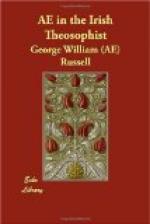“Into the Fire-King they go, they dream in his heart.” She half chanted, the passion of her speech not yet fallen away from her. “And where go the fires of men when they despair”? She was silent; then he continued half in scorn, “Your priestess is the priestess of ghouls and fays rather than a priestess of men; her wisdom is not for you; the spirits that haunt the elements are hostile because they see you full of fear; do not dread them and their hatred will vanish. The great heart of the earth is full of laughter; do not put yourselves apart from its joy, for its soul is your soul and its joy is your true being.”
He turned and passed through the crowd; the priestess made a motion as if she would have stayed him, then she drew herself up proudly and refrained. They heard his voice again singing as he passed into the darkening woods,
“The spirits to the fire-king throng
Each
in the winter of his day:
And all who listen to their song
Follow
them after in that way.
They seek the heart-hold of the king,
They
build within his halls of fire,
Their dreams flash like the peacock’s wing,
They
glow with sun-hues of desire.
I follow in no faery ways;
I
heed no voice of fay or elf;
I in the winter of my days
Rest
in the high ancestral self.”
The rites interrupted by the stranger did not continue much longer; the priestess concluded her words of warning; she did not try to remove the impression created by the poet’s song, she only said, “His wisdom may be truer. It is more beautiful than the knowledge we inherit.”
The days passed on; autumn died into winter, spring came again and summer, and the seasons which brought change to the earth brought change to the young priestess. She sought no longer to hold sway over the elemental tribes, and her empire over them departed: the song of the poet rang for ever in her ears; its proud assertion of kingship and joy in the radiance of a deeper life haunted her like truth; but such a life seemed unattainable by her and a deep sadness rested in her heart. The wood-people often saw her sitting in the evening where the sunlight fell along the pool, waving slowly its azure and amethyst, sparkling and flashing in crystal and gold, melting as if a phantom Bird of Paradise were fading away; her dark head was bowed in melancholy and all the great beauty flamed and died away unheeded. After a time she rose up and moved about, she spoke more frequently to the people who had not dared to question her, she grew into a more human softness, they feared her less and loved her more; but she ceased not from her passionate vigils and her step faltered and her cheek paled, and her eager spirit took flight when the diamond glow of winter broke out over the world. The poet came again in the summer; they told him of the change they could not understand, but he fathomed the depths of this wild nature, and half in gladness, half in sorrow, he carved an epitaph over her tomb near the altar,




